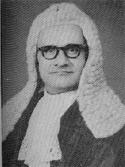
Meet Justice Bhuvneshwar Prasad Sinha and his Notable Judicial decisions
Justice Bhuvaneshwar Prasad Sinha (1899–1986) served as the 6th Chief Justice of India from October 1, 1959, to January 31, 1964, making his tenure one of the longest among Indian Chief Justices. Born in Shahabad (now Bhojpur), Bihar, into a prominent Rajput family, Sinha was known for his academic brilliance, integrity, and deep spirituality. He graduated with top honors in B.A. and M.A., earned a gold medal in history, and completed his legal studies at Patna Law College.
Judicial Career
Justice Sinha’s legal journey began as a Vakil at the Patna High Court in 1922, followed by roles as Advocate, Government Pleader, and Assistant Government Advocate. He became a permanent judge of the Patna High Court in 1943, Chief Justice of the Nagpur High Court in 1951, and was appointed to the Supreme Court in 1954. In 1959, he became Chief Justice of India, a position he held for over four years, during which he authored 137 judgments and sat on 684 benches.
Landmark Judgments and Contributions
1. Kerala Education Bill Reference (1958/1959)
Justice Sinha presided over the Supreme Court’s advisory opinion on the Kerala Education Bill, which addressed the constitutional validity of certain provisions affecting minority-run educational institutions. The Court, under his leadership, clarified the scope of Article 30 (right of minorities to establish and administer educational institutions), setting a precedent for the protection of minority rights in education.
2. Kharak Singh v. State of Uttar Pradesh (1962)
In this seminal case on the right to privacy, the Supreme Court, with Justice Sinha on the bench, examined the constitutional validity of police surveillance practices. The majority held that the right to privacy was not explicitly guaranteed under the Constitution, but Justice Subba Rao’s dissent (which later gained prominence) laid the groundwork for privacy as a fundamental right—a doctrine that would be fully recognized decades later.
3. Civil and Constitutional Jurisprudence
Justice Sinha’s tenure saw numerous important decisions in civil, criminal, and constitutional law. He was known for his scholarly approach, clarity, and balanced reasoning, helping to stabilize and shape the Supreme Court’s jurisprudence during a period of rapid legal development in post-independence India.
4. Administrative and Institutional Leadership
As Chief Justice, Sinha provided stability and direction to the Supreme Court, overseeing a period of significant growth and complexity in the Indian legal system. He was also active in legal education, serving as Pro-Chancellor of Delhi University, and contributed to public service through roles such as President of the Bharat Scouts and Guides.
Legacy
Justice Bhuvaneshwar Prasad Sinha is remembered as a pillar of integrity and scholarship in the Indian judiciary. His judgments and leadership helped lay the foundations of constitutional interpretation and minority rights in India. After retirement, he led a quiet, spiritual life, remaining respected for his wisdom and service to law and society.












comments